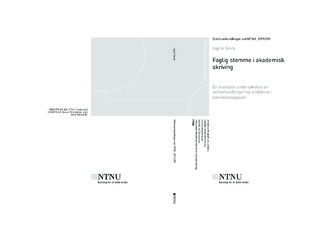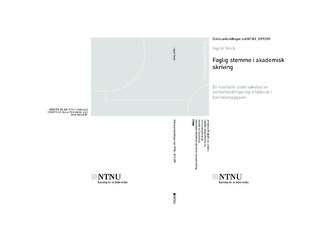| dc.contributor.advisor | Eik-Nes, Nancy Lea | |
| dc.contributor.advisor | Karsten, Andrea | |
| dc.contributor.author | Stock, Ingrid | |
| dc.date.accessioned | 2019-11-14T14:24:10Z | |
| dc.date.available | 2019-11-14T14:24:10Z | |
| dc.date.issued | 2019 | |
| dc.identifier.isbn | 978-82-326-4175-8 | |
| dc.identifier.issn | 1503-8181 | |
| dc.identifier.uri | http://hdl.handle.net/11250/2628607 | |
| dc.description.abstract | Sammendrag av avhandlingen
Studenters studiehverdag er preget av mye skriving, og i mange fag er det å lykkes med skriving nesten ensbetydende med å lykkes i høyere utdanning. I løpet av studietiden har de fleste studenter skrevet ulike typer tekster med stor variasjon når det gjelder omfang og krav, men bacheloroppgaven er ofte det første omfattende vitenskapelige arbeid de skal gjennomføre. Imidlertid er bacheloroppgaven en relativ ny sjanger i humanistiske fag, og den har ført til en del usikkerhet blant både studenter og faglærere, spesielt når det gjelder kravene til selvstendig vitenskapelig arbeid i en bacheloroppgave. Kriterier og forventninger til studentenes tekster er ofte lite gjennomsiktige og tydelige for studenter. Kravene til akademisk skriving kan til og med oppleves som motstridende: På den ene siden er bruk av andres ord, det vil si kilder, særlig viktig i akademisk skriving; på den andre siden kreves selvstendig tenkning, med andre ord fremvisning av en egen faglig stemme i teksten.
Med dette som utgangspunkt, har denne studien rettet oppmerksomhet mot studenters faglige stemmer slik de kommer til uttrykk i bacheloroppgaver. Hovedmaterialet i undersøkelsen er 15 bacheloroppgaver fra tre ulike fag innenfor humaniora. Kvalitative næranalyser av tekstene rettet fokuset mot skrivernes handlinger (for eksempel beskrive, tolke, diskutere) – det vil si hva studentene gjorde i sine tekster – og deres bruk av kilder. Formålet var å sette ord på og få innsikt i hvordan studentenes faglige stemmer kom til syne gjennom deres skrivehandlinger, og deres bruk av kilder i disse skrivehandlingene.
Avhandlingen er et bidrag til skriveforskningen innenfor anvendt språkvitenskap, spesielt forskning som har vært opptatt av spørsmål om stemme og identitet. Den bygger på et grunnleggende dialogisk, intertekstuelt syn på språk og skriving, som blant annet innebærer at skrivernes faglige stemmer ikke kan løsrives fra stemmer i den institusjonelle og faglige konteksten de skriver i. I de ulike delstudiene som inngår i den artikkelbaserte avhandlingen har jeg undersøkt noen av disse stemmene og deres ‘gjenklang’ i bacheloroppgavene.
Avhandlingen som helhet bidrar til skriveforskningen gjennom å fokusere på aspekter av stemme som er relatert til tekstens innhold: Hvordan kommer skrivernes stemmer til uttrykk gjennom skrivernes handlinger og kildenes funksjoner i disse skrivehandlingene? Denne tilnærmingen til stemme tilbyr et syn på skriving og tekster som levende ytringer og meningsfulle handlinger i stedet for å betrakte skriving som en instrumentell ferdighet. Studien er dermed også et bidrag til ‘academic literacies research’ som legger vekt på dimensjoner som er knyttet til spørsmål om identitet og (makt)relasjoner. Avhandlingen kan også bidra til ny innsikt i skrivepedagogikk og (skrive)veiledning. Funn fra analysene kan tjene som utgangspunkt for diskusjoner om bacheloroppgavens verdi og relevans. De tilbyr også fruktbare måter å snakke om tekst og kildebruk på: Å forstå skriving som handling og interaksjon innenfor en spesifikk faglig og institusjonell kontekst vil hjelpe studenter å konstruere sine faglige stemmer. | nb_NO |
| dc.description.abstract | Summary
Writing is a central activity in student life. Succeeding in writing is often equivalent to succeeding in higher education. In the course of their studies, most students write various types of texts, which differ in terms of length and other requirements. The bachelor thesis, however, is often the first comprehensive scientific work the students are required to carry out. In the humanities, the bachelor thesis is a relatively new genre, and this has led to uncertainty among both teachers and students, especially when it comes to requirements regarding independent scientific work. Criteria and expectations regarding students’ writing often lack transparency and are far from obvious for students. Requirements for academic writing can even be experienced as contradictory: On the one hand, using others’ words, i.e. sources, is a key to academic writing; on the other hand, there is a demand for independent thinking, i.e. using one’s own disciplinary voice.
With this as a background, this study has directed its attention to students’ disciplinary voices as they are conveyed in their bachelor theses. The primary data are 15 bachelor theses from three disciplines within the humanities. Qualitative in-depth analysis of the texts focused on writing acts (e.g. to describe, to interpret, to discuss) – what the students did in their texts – and how they used sources. The aim was to gain insight into and describe how students constructed their voices through their writing acts and their use of sources in these acts.
This study is a contribution to writing research in the field of applied linguistics, especially to research that addresses issues of voice and identity. The study is based on a dialogic, intertextual perspective on language and writing, presupposing that analyses of students’ disciplinary voices must take into consideration the voices from the institutional and disciplinary context. The different parts of this thesis have examined some of these voices and how they are echoed in the bachelor theses.
This thesis contributes to writing research through its focus on aspects of voice that are related to content features of a text: How are writers’ voices conveyed through the students’ writing acts and their use of citations in these writing acts? This approach to voice provides a view that considers writing and texts as active utterances and meaningful acts, rather than instrumental skills. Thus, the study is also a contribution to academic literacies research, which emphasizes dimensions in writing such as identity and power relations. This study may also contribute to new insight into writing pedagogy and supervision. The findings from the analyses can serve as a starting point for discussions about the bachelor thesis’ value and relevance. In addition, the findings provide fruitful ways for talking about text and source use: To understand writing as acts and interaction within a specific disciplinary and institutional context will help students to construct their disciplinary voices. | nb_NO |
| dc.language.iso | eng | nb_NO |
| dc.publisher | NTNU | nb_NO |
| dc.relation.ispartofseries | Doctoral theses at NTNU;2019:289 | |
| dc.relation.haspart | Paper 1: Stock, Ingrid; Eik-Nes, Nancy Lea. Voice features in academic texts – A review of empirical studies. Journal of English for Academic Purposes 2016 ;Volum 24. s. 89-99
https://doi.org/10.1016/j.jeap.2015.12.006 | nb_NO |
| dc.relation.haspart | Paper 2: Stock, Ingrid. Bacheloroppgaven - hvordan skal denne sjangeren forstås? En undersøkelse av bacheloroppgavens rammebetingelser. UNIPED 2017 ;Volum 40.(4) s. 325-345
https://doi.org/10.18261/issn.1893-8981-2017-04-05
This is an Open Access article distributed under the terms of the Creative Commons CC-BY (4.0)
License http://creativecommons.org/licenses/by-nc/4.0/ | nb_NO |
| dc.relation.haspart | Paper 3: Stock, I. & Eik-Nes, N.L. Writing acts in bachelor theses. What do they reveal about the genre?
- This article is awaiting publication and is not included in NTNU Open | nb_NO |
| dc.relation.haspart | Paper 4: Stock, I. Students´emerging voice. Bachelor students` source use between knowledge telling and knowledge transforming.
- This article is awaiting publication and is not included in NTNU Open | nb_NO |
| dc.title | Faglig stemme i akademisk skriving: En kvalitativ undersøkelse av skrivehandlinger og kildebruk i bacheloroppgaver | nb_NO |
| dc.type | Doctoral thesis | nb_NO |
| dc.subject.nsi | VDP::Humanities: 000::Literary disciplines: 040 | nb_NO |

